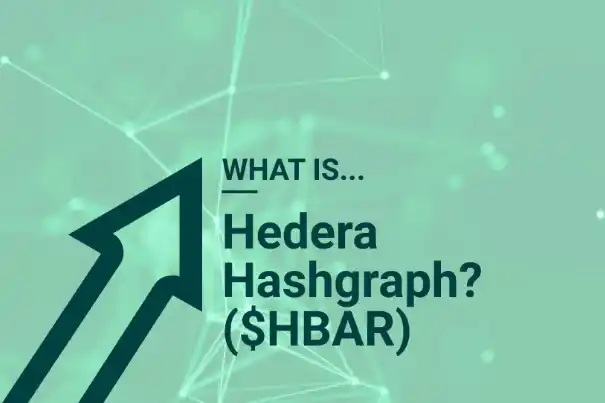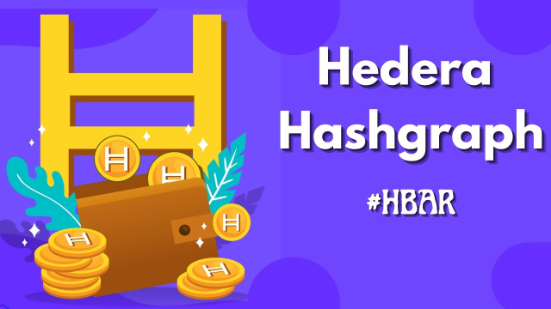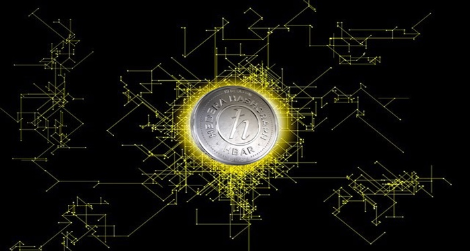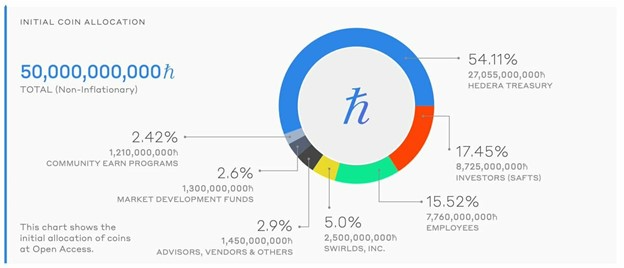What is Hedera Hashgraph (HBAR)?
Hedera (HBAR) is an Ethereum Blockchain platform. It uses Distributed Ledger Technology (DLT). The Hedera project allows developers to build decentralized applications (dApps) based on the Hashgraph data structure and consensus algorithm, creating a new platform for distributed consensus.
The special point of this project is its different operating mechanism compared to other Blockchains. Hedera allows developers and users to make transactions without having to disclose information about the other party and without relying on third parties for verification.
Hedera Hashgraph’s core products
The Hedera network consists of four main components:
-
Cryptocurrencies: The HBRA encrypted currency enables low-fee transactions on Hedera.
-
Smart Contract: Building dApps in many practical cases that can be used.
-
File services: Backup, distributed file storage with detailed management such as deletion, concatenation.
-
Consensus services: Ensure fast, fair and secure consensus in all applications.
The Hedera project has nodes licensed by the Hedera governing council, which are limited liability companies. Over time, Hedera will transition to a Permissionless Model.
Outstanding advantages of Hedera Hashgraph
Integrating the Gossip protocol
Gossip is a consensus protocol that operates through a virtual voting mechanism. This protocol allows users to exchange data quickly and easily.
At the same time, Gossip secures user information and assets through an encryption system that stores transaction histories. Although using the same algorithm, users still have multiple Node voting options. Through online voting, the community easily communicates and votes to achieve a certain consensus.
Good security capabilities
To increase the value of payment transactions exponentially, the project needs to deploy more advanced information security solutions. The Hedera project has integrated the aBFT consensus policy one of the leading security algorithms today.
Through the aBTF algorithm, all information and assets on Hedera are securely protected, almost absolutely. Therefore, hacking and information theft are almost impossible on Hedera.
Performance optimization
Hedera’s performance has been optimized up to 250,000 transactions/second. This number has surpassed the 100,000 transactions/second of Blockchain. At the same time, Hedera’s algorithm also provides extremely high-quality information processing capabilities, optimized per second. Therefore, users can improve performance in the transaction process.
Related: What Is Ethereum (ETH)? An Overview of the ETH Project
Ensuring fairness between traders
Since the inception of the project, Hedera’s founding team has always emphasized fairness. Therefore, Hedera always ensures consistent transaction order and fairness for everyone.
Management capabilities
Currently, the Hedera development team believes: public distributed ledger networks will be more reliable if managed by representatives from various industries. In the absence of governing members, a small group of final development members will make action decisions.
Stability and compliance
By integrating technical and legal policies, Hedera protects the stable ecosystem, unchanged. Because currently, many Hedera lack the legal and technical capabilities to override action decisions. This can completely create many elements when the Hedera network encounters problems.
What does Hedera Hashgraph solve?
Issues posed by Hedera Hashgraph
The Hedera Hashgraph development team mentioned some challenges that Distributed Ledger Technologies (DLT) are facing:
-
Performance issues: Current usage requirements require hundreds of transactions per second and latency of just a few seconds. However, current DLT platforms have barely met these requirements.
-
Security issues: To improve performance, current DLT platforms tend to easily lose decentralization, leading to security issues. The question is how to balance security and performance.
In addition, there are still problems with Governance, Stability, and legal compliance.
Hedera Hashgraph’s solutions
Right on the project’s homepage, the development team specially emphasized creating Hedera Hashgraph a network for businesses. In which, Hashgraph is the core element, ensuring high performance, fairness and security for this network.
The technologies inside the network include Sharding, Staking, and Smart Contracts.
-
Sharding: After the Mainnet operates and has the necessary number of nodes, Hedera will deploy Multiple Shards. Consensus is performed simultaneously, improving node performance. According to Hedera Hashgraph, the current speed can reach 10,000+ transactions per second, with fees of only about $0.0001 and transaction processing time within 3-5 seconds.
-
Staking: Token owners can stake to become nodes that directly process transactions. If they don’t want to be a Node, they can also delegate their HBAR Tokens to Node operators. Both of these ways help them earn HBAR Tokens.
-
Smart Contracts: Hedera uses the Solidity language for Smart Contracts, providing flexibility in deploying and executing smart contracts.
HBAR coin details
Basic token information
-
Ticker: HBAR
-
Blockchain: Hedera Hashgraph
-
Token Type: Utility Token
-
Token Standard: aBFT
-
Smart Contract: Updating
-
Decimal: Updating
-
Total Supply: 50,000,000,000 HBAR
-
Circulating Supply: 4,404,608,640 HBAR
Token Use Case
As the base currency of the Hedera Hashgraph blockchain, HBAR coins are used for the following purposes:
-
HBAR is used to pay fees on the Hedera Hashgraph.
-
Use HBAR to access dApps issued on Hedera Hashgraph.
-
HBAR is used for staking and becoming transaction processing nodes.
-
HBAR is used to use services within Hedera’s network.
-
When participating in node processing, nodes will receive rewards. And this reward is HBAR coin.
Token distribution
HBAR storage & exchange
HBAR storage
Hedera Hashgraph has its own wallet for HBAR, you can learn more about Hedera Wallet here.
HBAR exchange
You can trade HBAR on: Binance, Okx, Huobi, etc.
Project team, investors & partners
Project team
The Hedera project is the brainchild of Dr. Leemon Baird Co-Founder, CTO and CSO (Chief Science Officer). He has a PhD in Computer Science, various patents and is the author of many academic journal publications.
Besides Leemon Baird is Mance Harman Co-Founder and also CEO of the project. Both Baird and Harman worked together at Trio Security, and later at BlueWave Security.
Other members of the development team are also highly educated and experienced in this field.
Investors & partners
Roadmap & Updates
Q4 2021
-
Improve ecosystem for NFT.
-
React native SDK.
Q1 2022
-
Expand Smart Contract.
-
Optimize network performance.
Q2 2022
-
Enable ecosystem integration.
-
Launch Staking.
Conclusion
Through the above overview of the Hedera Hashgraph (HBAR) project, AZC News hopes readers will grasp the basic information about this project to make their own investment decisions. I wish you successful investments!













